 Is your business working with bloggers?
Is your business working with bloggers?
Do you blog?
This article examines new research that shows blogging is here to stay.
Like many social media tools, blogs have seen a steady increase in numbers and influence over the last several years.
Note the growth charted by Invesp. On Dec. 2, 2011, that number was 178,637,835 (according to BlogPulse).
Number of Blogs Grows
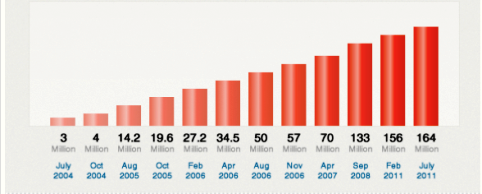
If people are adding nearly 3 million blogs per month, surely this is a tool worth understanding and maximizing. That is the conclusion Technorati reached in their 2011 State of the Blogosphere Report.
In this report, bloggers fall into one of five categories:
- Hobbyist—Someone who blogs for fun and doesn't report any income from blogging (this represents 60% of the study).
- Professional Part-time—These people typically blog to supplement their income and blog about personal musings or technology (approximately 9% of respondents).
- Professional Full–time—These individuals make their living by blogging, but typically work freelance (approximately 9% of respondents).
- Corporate—Corporate bloggers blog full-time as part of their job or are contracted to blog full-time for a company (8% of respondents).
- Entrepreneur—Entrepreneurs blog for a company or organization they own (13% of respondents).
***Please note that Technorati's data is heavily skewed by the presence of 60% hobbyist bloggers—people who blog as a way to express themselves or influence their community, but don't seek to make money. I will focus on results from the 40% of bloggers who have a business objective with their blogging.
#1: Bloggers are young, educated and experienced
Bloggers come from all over the world and span the age range. But with that diversity come some commonalities worth noting. (Go here to see all the statistical comparisons made by Technorati.)
Nearly 60% of bloggers are between the ages of 25 and 44.

Most bloggers are highly educated, with almost 30% having college degrees and an additional 50% who have started or completed a graduate degree.
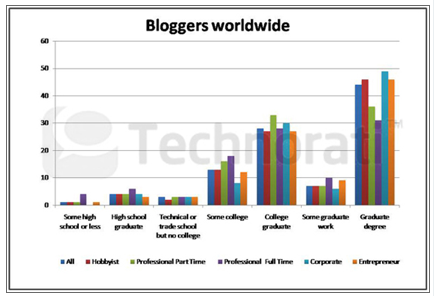
Most bloggers have been blogging for at least 2 years.
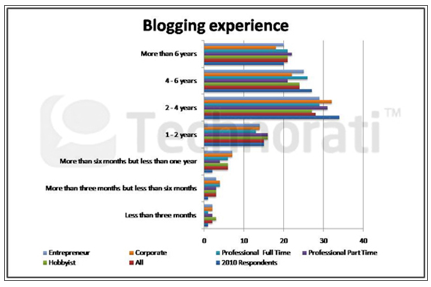
The average number of blogs managed by each respondent is three, up from two in 2010.
Get World-Class Marketing Training — All Year Long!
Are you facing doubt, uncertainty, or overwhelm? The Social Media Marketing Society can help.
Each month, you’ll receive training from trusted marketing experts, covering everything from AI to organic social marketing. When you join, you’ll also get immediate access to:
- A library of 100+ marketing trainings
- A community of like-minded marketers
- Monthly online community meetups
- Relevant news and trends updates
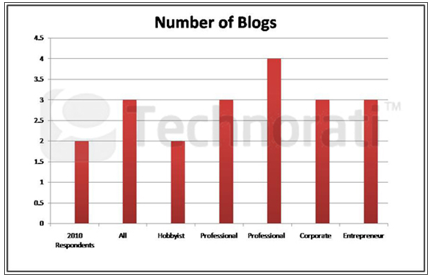
40% of bloggers spend more than 3 hours a week working on their blog.
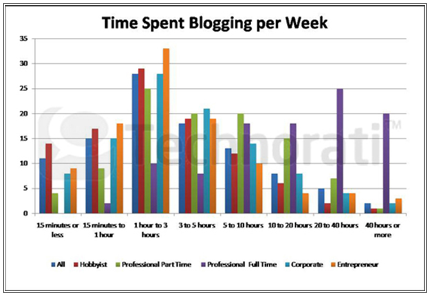
A majority of bloggers updates their blog at least two to three times per week.
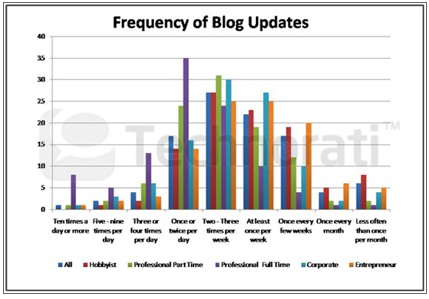
Key Takeaways:
- Most business bloggers post at least two to three times per week. If you're not posting that often, you're missing out on some great search engine optimization value. Read this article on the importance of this;
- A majority of bloggers have been at this for at least 2 years.
So, if you haven't started, why not start now? See this article by Marcus Sheridan for some reasons to get started.
#2: Bloggers help brands
Technorati found that a surprising one-third of bloggers have work experience in traditional media as journalists and in other capacities. They also found that consumers are increasingly putting their trust in blogs versus traditional media.
This reflects a major shift in marketing for brands of all sizes. Brands must become friendly with bloggers. If 40% of all blogs are business-oriented, that means there are around 72 million business blogs. Many of these represent an opportunity for you to foster mutually beneficial relationships with bloggers.
Not convinced? Check this out: 65% of bloggers follow brands on social media and most bloggers write regularly about the brands they follow.
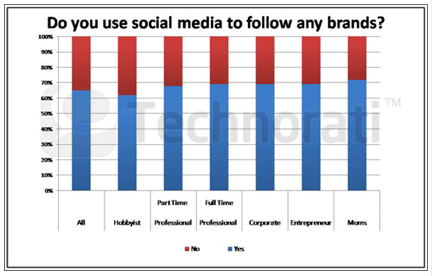
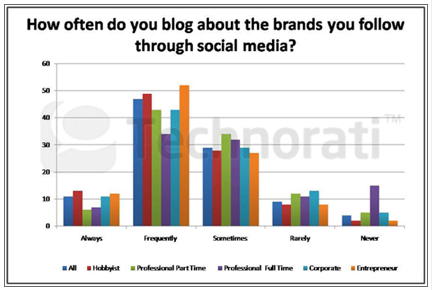
Key Questions:
- Do you know the bloggers who follow your brand?
- Are you connecting with them? What are they saying about your business?
- How can you help them achieve their goals while helping spread the word about your products, services and special offers?
- Have you considered developing a brand advocacy program with some of these bloggers?
#3: A growing number of consumers trust blogs
As expected, consumers receive their information primarily through friends, whether in real life or on social media. Of all social media platforms, consumers trust information they receive through blogs more than Facebook or Twitter.

Discover Proven Marketing Strategies and Tips
Want to go even deeper with your marketing? Check out the Social Media Marketing Podcast! Publishing weekly since 2012, the Social Media Marketing Podcast helps you navigate the constantly changing marketing jungle, with expert interviews from marketing pros.
But don’t let the name fool you. This show is about a lot more than just social media marketing. With over 600 episodes and millions of downloads each year, this show has been a trusted source for marketers for well over a decade.
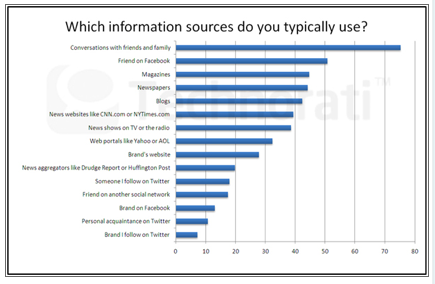
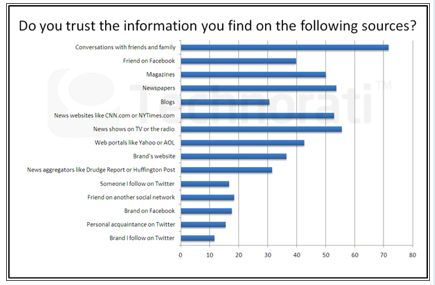
Consumers are almost as likely to share information they find on a blog as from a newspaper or magazine.
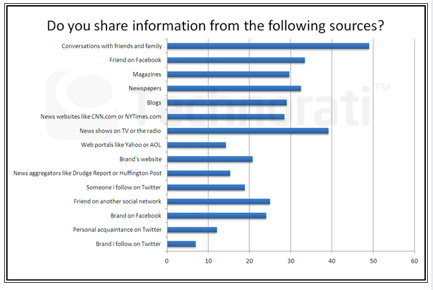
Consumers are most likely to share information they find on blogs through email and Facebook with Twitter being the third most likely.
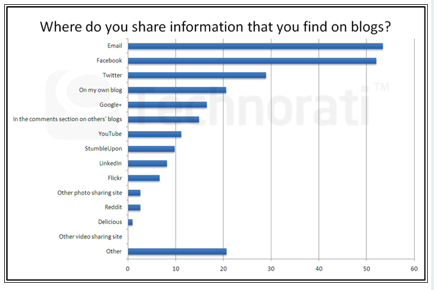
Key Questions:
- Are you making it easy for your followers to share your posts?
- Are you focused on becoming a trustworthy resource for your fans?
- Because blog posts have a longer shelf life than Facebook or Twitter, are you spending adequate time creating content worth viewing in 6 months or 2 years?
#4: Bloggers depend increasingly on social media
Bloggers get their inspiration and insights from social media.
Bloggers spend 10-12 hours weekly on social media sites, with 14% spending at least 21 hours. Additionally, bloggers spend another 8 hours weekly reading other blogs.
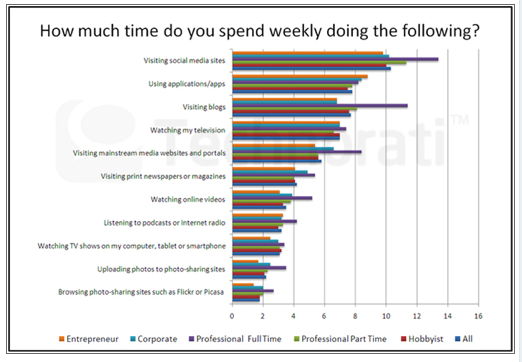
Bloggers “like” Facebook.
Over 90% of bloggers use Facebook and at least 65% of non-corporate professional bloggers have a Facebook page for their blog.
The primary way bloggers use Facebook is to promote their blog, but a significant 61% of entrepreneurs also use Facebook to market their business.
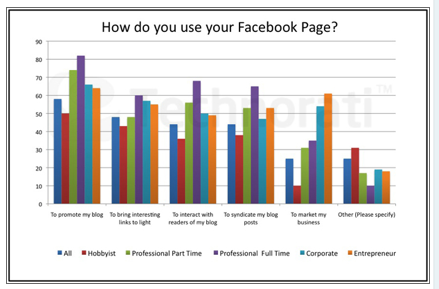
Twitter is very important for bloggers.
Over 80% of bloggers use Twitter and all professional bloggers have at least 1000 followers.
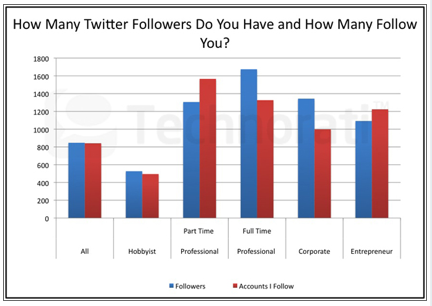
Around 80% of bloggers use Twitter to promote their blog.
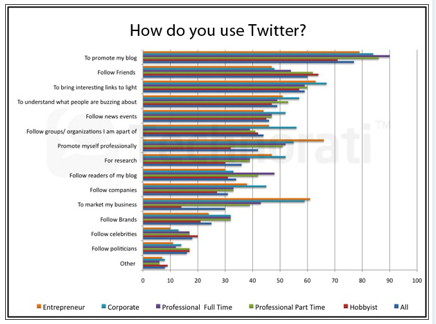
Bloggers are early adopters of Google+.
This is one of the first studies I've seen on Google+ adoption. Over 60% of all surveyed bloggers have a Google+ account, but few had established a page.
Here are some of the ways bloggers use Google+:
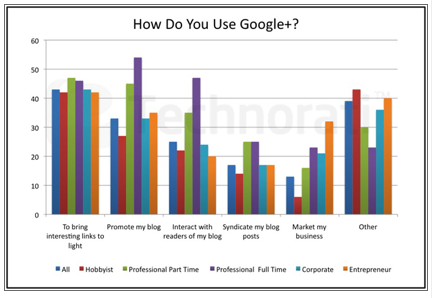
Bloggers have a diverse social media toolkit.
Not surprisingly, LinkedIn and YouTube are the top social media platforms used by bloggers. At least 30% of professional bloggers also make use of StumbleUpon, Delicious and Digg.
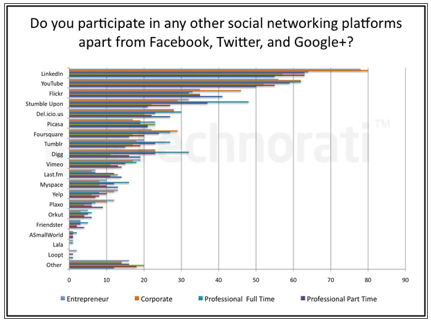
The most effective social tools for driving traffic are Facebook and Twitter, with LinkedIn being a distant third.
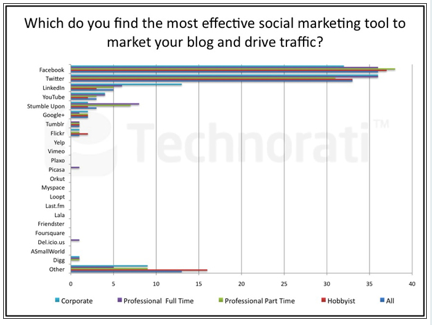
Key Takeaways:
- Bloggers look to Facebook and Twitter to drive traffic to their blogs. Do you? Here are 19 tips on how to do that from Denise Wakeman;
- Many pro bloggers have at least 1000 followers on Twitter. Here are 17 tips from social media pros on how to maximize your Twitter marketing.
#5: Bloggers use multimedia
Around 90% of bloggers use some form of media in their posts, with photos being the most popular.
Videos are also widely used by almost 50% of all bloggers.
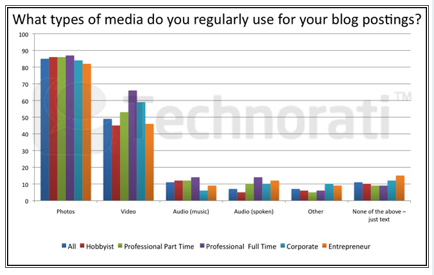
#6: Bloggers are earning money through their blogs
While only 14% of bloggers earn a salary through blogging, bloggers are increasingly finding ways to earn money through advertising and brand partnerships. If you're interested in knowing how bloggers approach revenue and advertising, see these interesting results.
#7: Bloggers are increasing their activities
Professional bloggers are generally increasing their blogging activity since they started blogging.
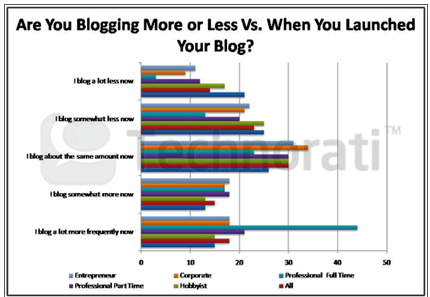
How about you? Do your 2012 business plans include blogging? Leave your questions and comments in the box below.
Attention Agency Owners, Brand Marketers, and Consultants

Introducing the Marketing Agency Show–our newest podcast designed to explore the struggles of agency marketers.
Join show host and agency owner, Brooke Sellas, as she interviews agency marketers and digs deep into their biggest challenges. Explore topics like navigating rough economic times, leveraging AI, service diversification, client acquisition, and much more.
Just pull up your favorite podcast app, search for Marketing Agency Show and start listening. Or click the button below for more information.

